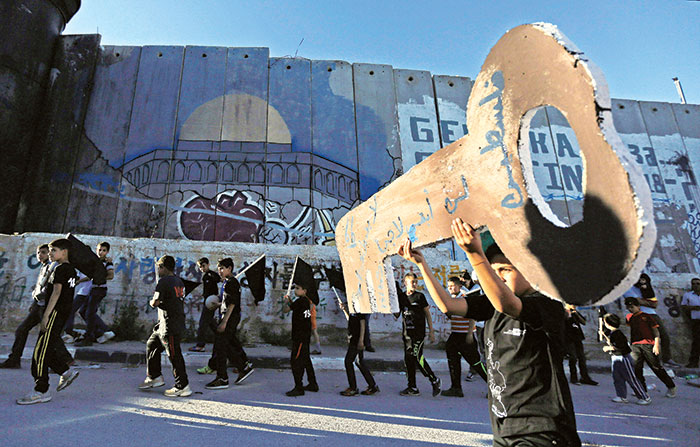
|
| A Palestinian boy holds a large cut-out of a key symbolizing the right to return, near the Apartheid Wall in Bethlehem May 14, 2014 |
The 68th anniversary of Nakba on May 15 came at a time when the Arab masses are dealing with their own catastrophic civil war, while the fragmented Palestinian leadership fails to represent the aspirations of the people.
The state of Israel was established on the land of indigenous Palestinians who were forced out of their homes.
Peace cannot prevail as long as those refugees and their descendants are not compensated or offered a choice to return to their homelands.
The establishment of Israel in 1948 rendered 700,000 Palestinians homeless in the diaspora, with nothing but tents and keys to homes they would never see again.
As Palestinians struggle under siege and occupation in the West Bank and Gaza, their compatriots in exile are living in dire conditions. They dream of returning home.
The failed peace process has never seriously addressed the plight of Palestinian refugees and their descendants.
Palestinians’ right to sovereignty and self-determination cannot be separated from the right of return. Palestine has a right to exist.
Apartheid supporters want to silence the debate about refugees. They argue that what is done is done and the millions of Palestinians should forget the land they left almost seven decades ago.
However, the state of Israel came to being on the premise of ancient theological claims of the Jewish people to the land of Palestine. Palestinians’ bond to Palestine is much more recent. Zionist Americans embark on “birth right” trips to Israel, based on a 2000-year-old claim. Is it impractical to say Palestinians who fled those cities 68 years ago have a right to return?
Until the right to return is fulfilled, Arab countries hosting Palestinians need to improve the living conditions of refugees.
In Lebanon, there are clear discriminatory laws that bar Palestinians from certain professions. They are confined to impoverished camps where the absence of Lebanese security forces has created a safe haven for criminals and extremists. While virtually all Lebanese politicians are opposed to naturalizing the hundreds of thousands of refugees, Palestinians in Lebanon do not need citizenship to be treated like humans.
The camps lack adequate infrastructure. Homes are rundown; the sewage system is dysfunctional; the roads are riddled with potholes; the sky is partially blocked by a web of electric cords. Electricity is an occasional visitor. There is no drinking war.
The United Nation’s aid does little to improve the conditions. Meanwhile, wealthy Arab states have made no significant humanitarian contributions to aid refugees over the past seven decades.
Instead, they are spending their fortunes to finance wars in Yemen, Iraq, Syria and Libya, destroying those countries and turning millions of Arabs into refugees.
In Syria, Palestinians are caught between a rock and a hard place in the ongoing civil war. Both sides have committed abuses against the Palestinian Yarmouk Camp.
The Palestinian leadership in the diaspora has contributed to the crisis by involving itself in the internal affairs of host nations, particularly Lebanon, Syria and Jordan.
Wake up call
Palestine’s Nakba should be a call for the people of the region. While Arabs continue to turn their guns against each other, from Syria to Iraq to Yemen, the colonization of Palestine is ongoing.
This anniversary passed without major commemorations in the Arab world. Facing their own catastrophes, Arab peoples are ignoring Palestine.
But the Palestinian cause should not be a burden. It should be promoted to encourage intra-Arab reconciliation.
Arabs and Arab Americans may disagree on every conflict in the Middle East, but when it comes to Palestine, they find common grounds. They should capitalize on this consensus to build bridges of dialogue and peace.
It is shameful that the local Arab American community largely disregarded Nakba Day. Community leaders and activists did not organize major events to pay tribute to the occasion.
Remembering Nakba has tangible implications. Nakba Day is an opportunity for local Arab Americans to spread awareness about the plight of Palestinians.
U.S. public opinion is shifting on the Israeli-Palestinian conflict, as more Americans who do not rely on corporate media as their source of news are realizing that their government should stop supporting the Israeli Apartheid.
The number of Americans under the age of 36 who sympathize with Palestinians has risen from 9 to 20 percent over the past decade, according to a Pew poll released earlier this month.
Arab Americans have a responsibility to highlight the injustices that Palestinians face daily. If the American people put enough pressure on their government to change its biased approach that sponsors Israel and turns a blind eye to its war crimes and racist policies, they can contribute to Palestinian liberation.
However, as left-leaning Americans, including Jewish Americans, are advocating for Palestinians, Arab Americans are increasingly ignoring the issue.
Another Nakba day has passed and the catastrophe is still unfolding.






Leave a Reply